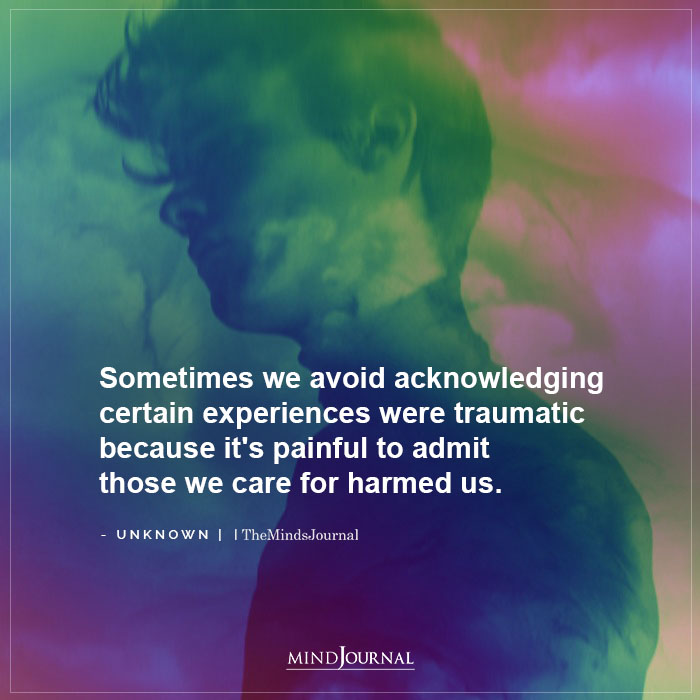Everyone is affected by trauma but not everyone deals with it and heals. Some bury it because doing something about it is painful. Others feel helpless and don’t know what to do about it.
And many dismiss their pain comparing it to tragedies like shootings, plane crashes, and weather disasters. All of those will keep you trapped in the pain.
The only way to get rid of the pain is to do something about it.
YOUR trauma matters and YOU can do something about it to get free.
Let’s start by defining trauma.
How do you define it? Do you define it by circumstances or by effects?
I asked a group of people How would you define trauma? and got some pretty amazing results.
Related: 4 Ways You Can Heal Trauma Bond After a Narcissistic Relationship
DEFINING TRAUMA
- Nightmares that get scarred onto your mind, body, and soul.
- Something that can hide in us and suddenly appear just long enough to mess us up.
- Something that changes the footprint of your life.
- Something painful/devastating/disappointing that changes you forever and requires a process to “get through”
- A deep imprint on our soul…the influences can overtake our lives and is healed by the hand of God.
- A catastrophic event that highjacks your brain and only God can heal it.
- Sudden exposure to tragedy leaving it etched in your minds-eye.
- Anything that shocks you deeply.
- Any event that leaves a permanent bruise on your body, brain or soul, healed only by divine intervention.
- Any event in your life that traumatized you. No matter what anyone else says about it!
All those point to the profound effect on the person.
None of them measure the pain by someone else’s.
That tells me, people instinctively know that trauma is personal. However, that’s not enough.
Knowing what trauma is when someone asks you is different than addressing it in your own life.

YOUR TRAUMA MATTERS
Because it has side effects that will wreak havoc in your life if not addressed.
We all walk through life experiences differently. We have different perceptions, perspectives, and thresholds for pain and suffering.
What one person can endure may leave another person emotionally devastated.
It’s not shameful to be traumatized.
But shame will show up.
- Shame will compare their trauma with your trauma saying you have no right to feel that way.
- Shame will say God is mad at you and you did something to deserve it.
- Shame will say you don’t deserve love.
Shame lies – you ARE worthy of love!
Related: Gas Lighting – Something, everyone should know about. Are you a Victim Too ?
The trauma trapped inside you has nothing to do with how others see it, and no matter what happened – God didn’t do it to you.
It matters because you’re the only one who can do something about it.
Do you find yourself on the chart above?
Have you experienced being triggered into reliving a trauma?
Do you have internal screaming going on?
You don’t have to keep living with your trauma.
Trauma is personal. It does not disappear if it is not validated. When it is ignored or invalidated the silent screams continue internally heard only by the one held captive. When someone enters the pain and hears the screams healing can begin. ― Danielle Bernock, Emerging with Wings: A True Story of Lies, Pain, and the Love That Heals
WHAT TO DO ABOUT IT
To heal of your trauma you must take ownership of it.
I won’t lie to you—it takes work but it’s worth it.
The pain, the anguish and triggers trauma plants in us require validation and compassion or they will never heal.
- Don’t measure it—validate it.
- Don’t minimize it—see it.
- Own it by calling it what it is—a trauma.
You can’t heal what you don’t identify.
Process your feelings.
- Identify what trauma is saying—talk back.
Trauma silently talks to us.
Learning this was eye-opening to me. I hadn’t been aware that trauma had built a negative mindset that whispered to me with every trigger.
All I knew was the basket case I turned into and the shame that followed over my seemingly unwarranted reaction (my measurement).
Related: How to Discover Your Deepest, Darkest Core Wound
I had to discover this invisible mindset and find the words that would silence the voice of trauma. It took a lot of processes. The process I went through the first time is in chapter eight of my first book.
Talking back to the trauma when I got triggered changed my life. Words are powerful. It took time to bring results but every time I talked back I gained ground.
- Dealing with trauma can cause triggers—don’t do it alone.
- Get help—there’s no shame in asking for help.
We need someone to enter our pain with us. To validate the pain and suffering along with us. This can be a trusted friend, a support group, a professional counsellor, or a life coach. I’ve received help from all of those and offer that same help to others.
Do you have the tendency to diminish your value? I did.
Shame says we’re not worthy of the love and compassion needed to heal.
Shame lies – you ARE worthy of love!
Dealing with your trauma will silence shame.
TAKE ACTION
- Let me come alongside and help you – schedule a free consultation.
- Not ready to talk yet – get this book.
- Have you addressed trauma in your life already? Share what helped you.
Written by: Danielle Bernock
Originally appeared on daniellebernock.com and is republished with permission.










Leave a Reply